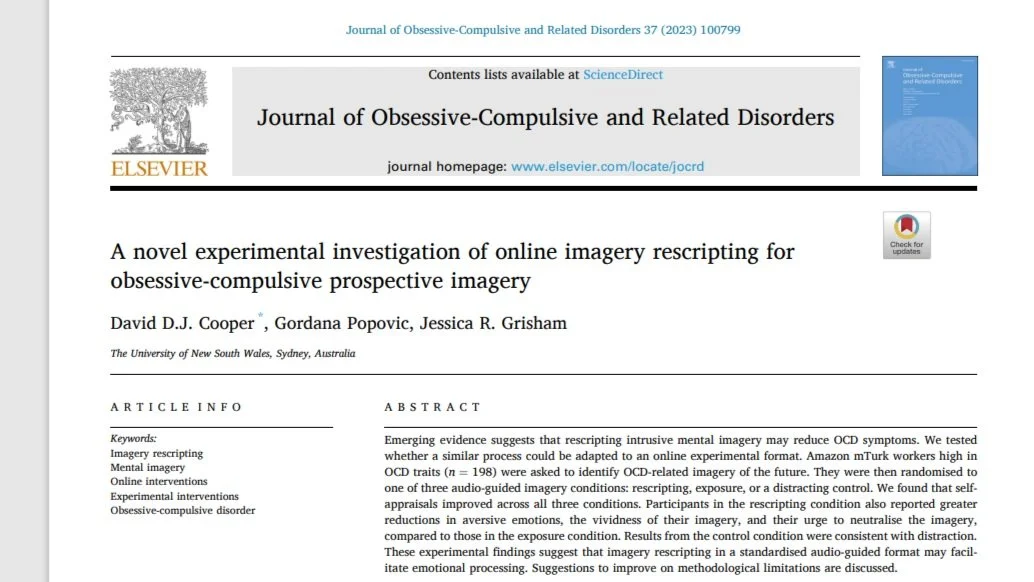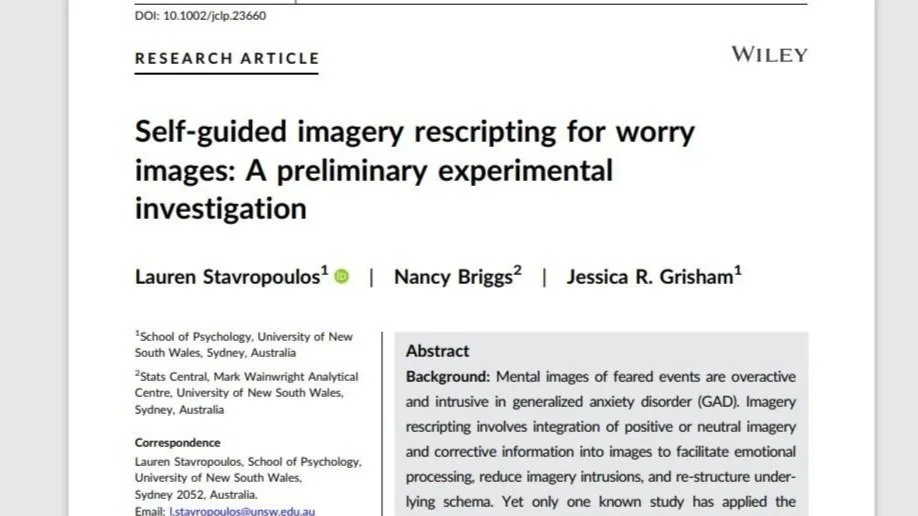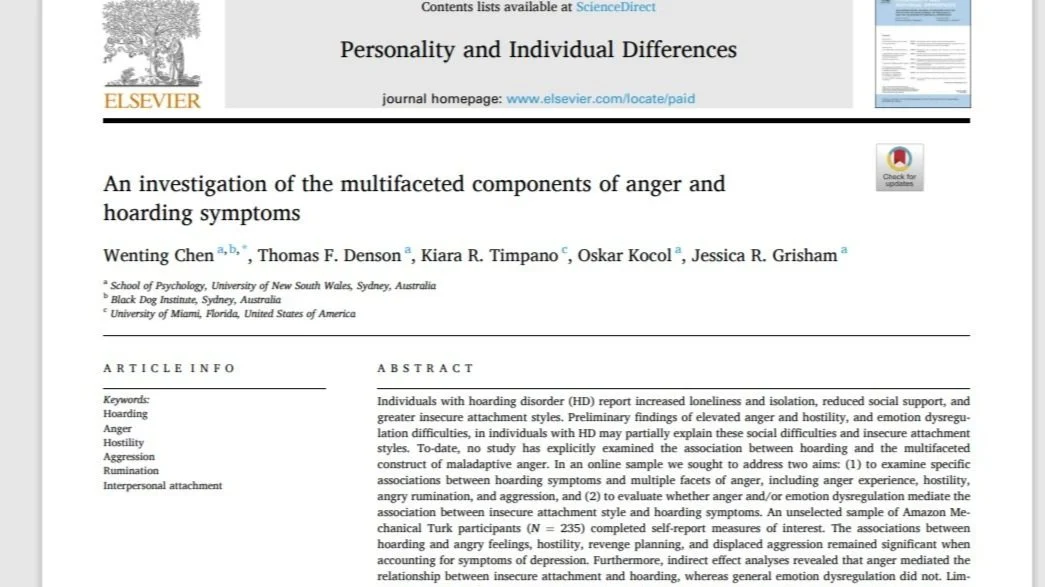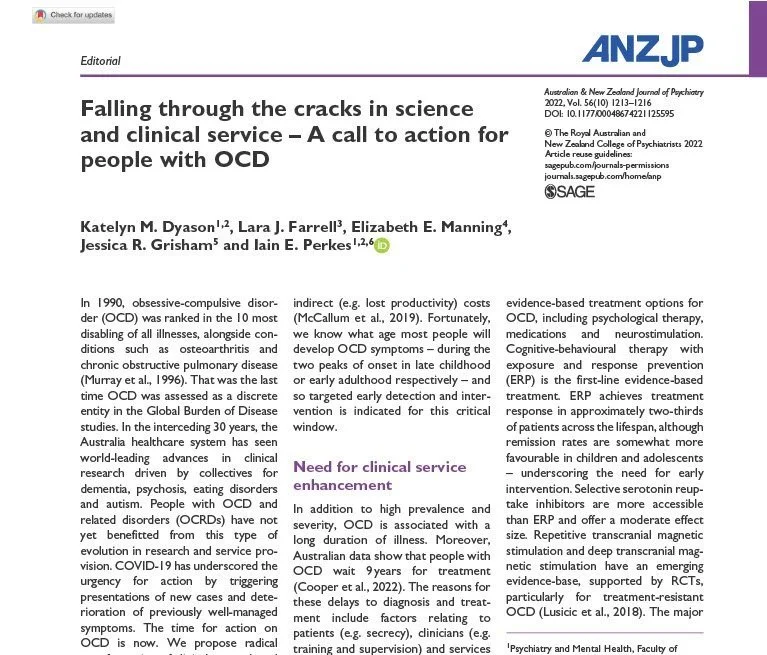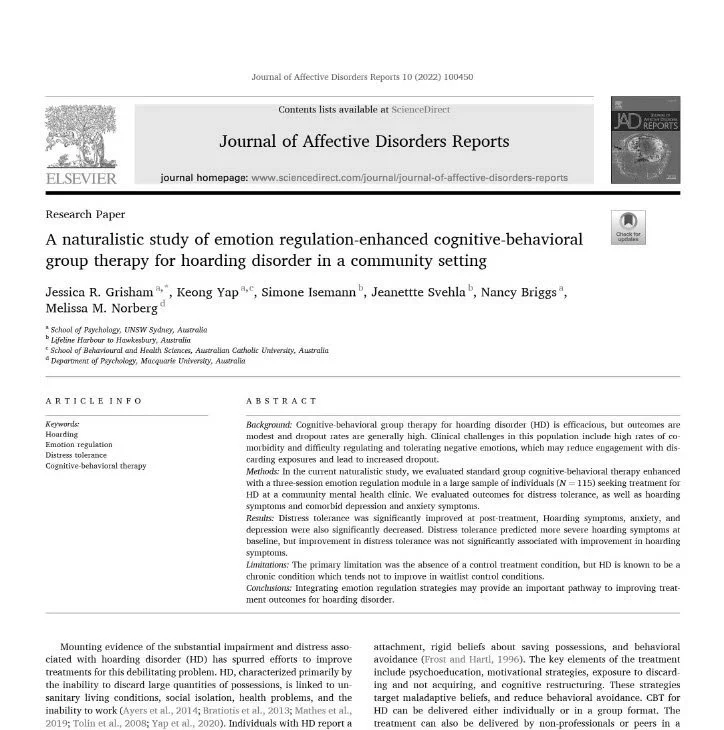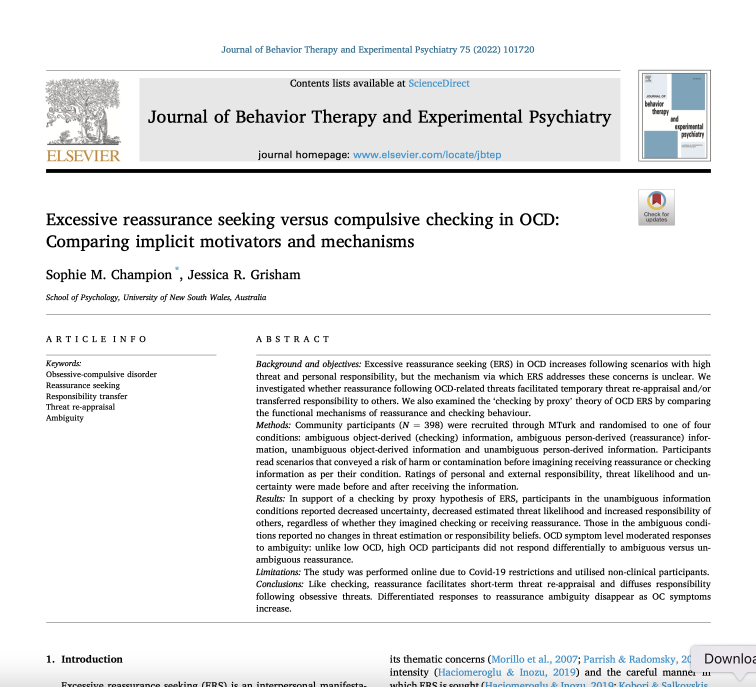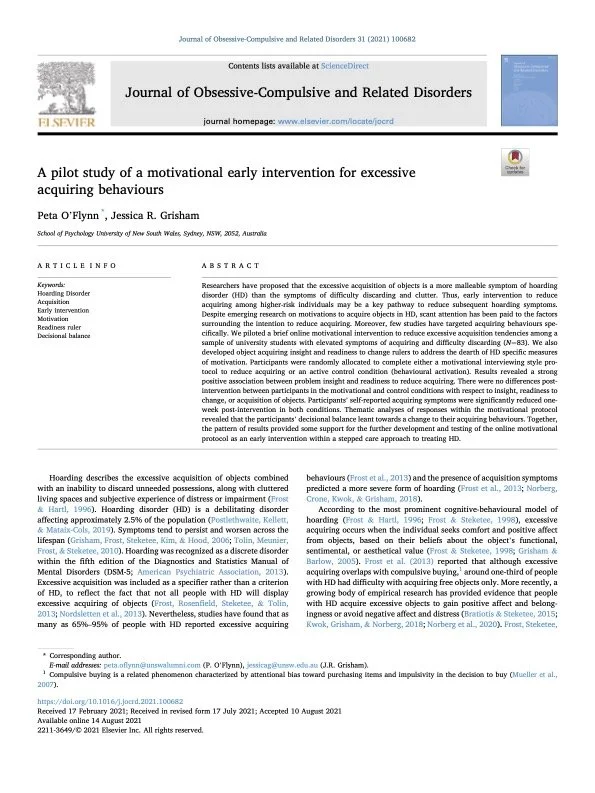Publications and Grants

Select scholarly book chapters
Moulds, M., Grisham, J.R., & Graham, B. (2023). Cognitive Behavioral Therapy for Anxiety. In O. Braddick (Ed.) The Oxford Research Encyclopedia of Psychology. Oxford: Oxford University Press.
Grisham, J. R., Norberg, M. M., & Yap, K. (2023). Treatment of compulsive hoarding. In D. Tolin (Ed). Oxford Handbook of Obsessive-Compulsive and Spectrum Disorders. Oxford: Oxford University Press.
Grisham, J.R. & Williams, A.D. (2014). Assessing hoarding and related phenomena. In R. Frost & G. Steketee (Eds.). The Oxford Handbook of Hoarding and Acquiring. Oxford: Oxford University Press (pp. 235-247).
Grisham, J. R., Williams, A. D., & Kadib, R. (2011). Hoarding as behavioural addiction. In B. A. Johnson (Ed.). Addiction Medicine: Science and Practice, pp. 687-703. New York: Springer.
Poulton, R., Grisham, J. R., & Andrews, G. (2009). Developmental approaches to understanding anxiety disorders. In M. Antony & M. Stein (Eds.). Handbook of Anxiety and the Anxiety Disorders (pp. 123-136). Oxford: Oxford University Press
Grisham, J. R., Brown, T. A., & Campbell, L. A. (2004). The Anxiety Disorders Interview Schedule for DSM-IV. In M. Hersen, D. L. Segal, & M. J. Hilsenroth (Eds.). Comprehensive handbook of psychological assessment, Volume 2: Personality assessment (pp. 163-177). New York: Wiley.
Funded research projects
2023-2025
Co-Chief Investigator (Lead Investigator Lara Farrell). Rotary Health Grant. Farrell, Waters, Donovan, Perkes, Grisham, March, Dyason, McKenzie, Simcock, Ware, Byrnes (2023 – 2025). FAST (Families Accessing online Skills Training) CBT for Paediatric OCD: A nationwide randomised controlled trial. ($227, 997)
2017-2020
Co-Chief Investigator (Lead Investigator Peter McEvoy), National Health and Mental Health Research Council, “Imagery in Social Anxiety” ($480,000)
2017-2018
Chief Investigator, UNSW Faculty Research Grant, “The Power of Ownership: Understanding Our Attachment to Stuff” ($18,000 AUD)
2016-2017
Co-Investigator (Principal Investigator Melissa Norberg), International OCD Foundation, “Explicating the Influence of Object Attachment in Hoarding Disorder” ($49,310)
2015-2019
Sole Chief Investigator, ARC Future Fellowship, "Interpreting intrusions: Illuminating the cognitive mechanisms that fuel obsessional thought" ($682,000). Awarded for research into the role that cognitive biases play in obsessional thought. This research project aims to employ a novel, computerised experimental methodology to directly manipulate the cognitive processes behind obsessional thinking.
2014-2015
Chief Investigator, June Griffith Fellowship for Academic Women in Leadership, “Modifying Biases in OCD” ($50,000 AUD)
2014-2015
Co-Chief Investigator, UNSW Gold Star Award, “Repetitive Thinking: A Failure to Disengage?” ($30,000 AUD
2014-2015
Co-Chief Investigator, UNSW Gold Star Award, “Cognitive Processing Biases in Obsessive-Compulsive Disorder” ($60,000 AUD)
2013-2014
Chief Investigator, UNSW Faculty Research Grant, “Modifying Interpretive Bias in Obsessive-Compulsive Disorder: A novel computerised intervention” ($30,000)
2012-2013
Chief Investigator, UNSW Dean’s Carers Fellowship, “Neuropsychological Functioning in Compulsive Hoarding” ($25,000)
2009-2011
Sole Chief Investigator, Australian Research Council Project Grant "Cognitive Control in Obsessive-Compulsive Disorder” ($160,000)
2009-2011
Co-Chief Investigator, Australian Research Council Project Grant “Regulating Anger: Cognitive Reappraisal, Emotional Suppression, and Post-event Rumination” (T. Denson & M. Moulds, Co-CIs, $170,000)
2008-2009
Chief Investigator, UNSW Gold Star Award “Thought suppression in obsessive-compulsive disorder” ($40,000)
2007-2008
Chief Investigator, UNSW Faculty Research Grant “Acceptance versus suppression in social phobia” ($30,000)
2006
Vice-Chancellor’s Postdoctoral Fellowship ($240,000)
Journal publication list
Cooper, D. D., Perkes, I. E., Lam-Po-Tang, J., Farrell, L. J., Brakoulias, V., & Grisham, J. R. (2023). Finding help for OCD in Australia: development and evaluation of a clinician directory. Australian Psychologist, 58, 190-197.
Dyason, K. M., Ozkul, B., Knight, K., Sara, G., Brakoulias, V., Farrell, L. J., Grisham, J.R. & Perkes, I. E. (2023). Hospital admission characteristics for children and adolescents with OCD in Sydney, Australia. General Hospital Psychiatry, S0163-8343.
Farrell, L. J., Waters, A. M., Storch, E. A., Simcock, G., Perkes, I. E., Grisham, J. R., ... & Ollendick, T. H. (2023). Closing the Gap for Children with OCD: A Staged-Care Model of Cognitive Behavioural Therapy with Exposure and Response Prevention. Clinical Child and Family Psychology Review, 26, 642-664.
Chen, W., McDonald, S., Wearne, T., Sabel, I., Long, E. V., Grisham, J. R. (2023). A pilot study of adapted social cognition and intervention training (SCIT) for hoarding disorder. Journal of Obsessive-Compulsive and Related Disorders, 36, 100776. https://doi.org/10.1016/j.jocrd.2022.100776.
Cooper, D.D.J., Popovic, G., & Grisham, J. R. (2023). A novel experimental investigation of online imagery rescripting for obsessive-compulsive prospective imagery. Journal of Obsessive-Compulsive and Related Disorders, 37, 100799. https://doi.org/10.1016/j.jocrd.2023.100799.
Timpano, K.R., Goodman, Z.T., Kushner, M.L., Hudiburgh, S.E., Rodriguez, C.I., Grisham, J.R. (2023). Using item response theory to investigate potential gender bias in hoarding symptoms. Journal of Obsessive-Compulsive and Related Disorders, 37, 100788. https://doi.org/10.1016/j.jocrd.2023.100788.
Wong, S.F., Dewar, E., Baldwin, P. A., Grisham, J. R. (2023). Evaluating the effects of a brief motivational interviewing protocol on excessive acquisition. Journal of Behavior Therapy and Experimental Psychiatry, 101790. https://doi.org/10.1016/j.jbtep.2022.101790.
Champion, S. M., & Grisham, J. R. (2022). Excessive reassurance seeking versus compulsive checking in OCD: Comparing implicit motivators and mechanisms. Journal of Behavior Therapy and Experimental Psychiatry, 75. https://doi.org/10.1016/j.jbtep.2021.101720
Cooper, D., Champion, S. M., Stavropoulos, L., & Grisham, J. R. (2022). How technology can enhance treatment: A scoping review of clinical interventions for anxiety and obsessive-compulsive spectrum disorders. British Journal of Clinical Psychology, 61(S1), 8–30. https://doi.org/10.1111/bjc.12279
Grisham, J. R., Yap, K., Isemann, S., Svehla, J., Briggs, N., Norberg, M. M. (2022). A naturalistic study of emotion regulation-enhanced cognitive-behavioral group therapy for hoarding disorder in a community setting. Journal of Affective Disorders Reports, 10, 100450. https://doi.org/10.1016/j.jadr.2022.100450.
Chen, W., McDonald, S., Wearne, T., & Grisham, J. (2021). Investigating associations between hoarding symptoms and affective and cognitive empathy. British Journal of Clinical Psychology, 60(2), 177–193. https://doi.org/10.1111/bjc.12280
Chia, K., Pasalich, D. S., Fassnacht, D. B., Ali, K., Kyrios, M., Maclean, B., & Grisham, J. R. (2021). Interpersonal attachment, early family environment, and trauma in hoarding: A systematic review. Clinical Psychology Review, 90. https://doi.org/10.1016/j.cpr.2021.102096
Croft, J., Grisham, J. R., Perfors, A., & Hayes, B. K. (2021). Risking Everything in Obsessive–Compulsive Disorder: An Analogue Decision-Making Study. Journal of Psychopathology and Behavioral Assessment. https://doi.org/10.1007/s10862-021-09901-3
Froreich, F. V., Vartanian, L. R., Grisham, J. R., & Pinkus, R. T. (2021). The psychological effects of blind and open weighing in women with a high drive for thinness: A mixed method inquiry. Body Image, 39, 232–236. https://doi.org/10.1016/j.bodyim.2021.09.002
O’Flynn, P., & Grisham, J. R. (2021). A pilot study of a motivational early intervention for excessive acquiring behaviours. Journal of Obsessive-Compulsive and Related Disorders, 31. https://doi.org/10.1016/j.jocrd.2021.100682
Stech, E. P., Chen, A. Z., Sharrock, M. J., Grierson, A. B., Upton, E. L., Mahoney, A. E. J., Grisham, J. R., & Newby, J. M. (2021). Internet-delivered exposure therapy versus internet-delivered cognitive behavioral therapy for panic disorder: A pilot randomized controlled trial. Journal of Anxiety Disorders, 79. https://doi.org/10.1016/j.janxdis.2021.102382
Wong, S. F., Krause, S., Marishel, D., & Grisham, J. R. (2021). Reappraisal of disgust: Self-report and behavioural assessment of individuals with moderate to high contamination fears. Journal of Anxiety Disorders, 78. https://doi.org/10.1016/j.janxdis.2020.102346
Wong, S. F., Lim, V., Black, M. J., & Grisham, J. R. (2021). The impact of modifying obsessive-compulsive beliefs about perfectionism. Journal of Behavior Therapy and Experimental Psychiatry, 73.https://doi.org/10.1016/j.jbtep.2021.101675
Yap, K., & Grisham, J. R. (2021). Object attachment in hoarding disorder and its role in a compensatory process. Current Opinion in Psychology, 39, 76–81. https://doi.org/10.1016/j.copsyc.2020.07.022
McEvoy, P. M., Hyett, M. P., Bank, S. R., Erceg-Hurn, D. M., Johnson, A. R., Kyron, M. J., Saulsman, L. M., Moulds, M. L., Grisham, J. R., Holmes, E. A., Moscovitch, D. A., Lipp, O. V., Campbell, B. N. C., & Rapee, R. M. (2020). Imagery-enhanced v. Verbally-based group cognitive behavior therapy for social anxiety disorder: A randomized clinical trial. Psychological Medicine. https://doi.org/10.1017/S0033291720003001
Norberg, M. M., Beath, A. P., Kerin, F. J., Martyn, C., Baldwin, P., & Grisham, J. R. (2020). Trait Versus Task-Induced Emotional Reactivity and Distress Intolerance in Hoarding Disorder: Transdiagnostic Implications. Behavior Therapy, 51(1), 123–134. https://doi.org/10.1016/j.beth.2019.05.010
Norberg, M. M., David, J., Crone, C., Kakar, V., Kwok, C., Olivier, J., & Grisham, J. R. (2020). Determinants of object choice and object attachment: Compensatory consumption in compulsive buying-shopping disorder and hoarding disorder. Journal of Behavioral Addictions, 9(1), 153–162. https://doi.org/10.1556/2006.8.2019.68
Norberg, M. M., Kwok, C., Crone, C., David, J., Kakar, V., & Grisham, J. R. (2020). Greater interpersonal problems differentiate those who excessively acquire and save from those who only excessively acquire possessions. Journal of Obsessive-Compulsive and Related Disorders, 27. https://doi.org/10.1016/j.jocrd.2020.100571
Wong, S. F., Hu, D. A. P., & Grisham, J. R. (2020). Manipulating visual perspective for obsessional imagery and its impact on obsessive-compulsive symptoms in an analogue sample. Journal of Anxiety Disorders, 72. https://doi.org/10.1016/j.janxdis.2020.102227
Yap, K., Eppingstall, J., Brennan, C., Le, B., & Grisham, J. R. (2020). Emotional attachment to objects mediates the relationship between loneliness and hoarding symptoms. Journal of Obsessive-Compulsive and Related Disorders, 24. https://doi.org/10.1016/j.jocrd.2019.100487
Yap, K., & Grisham, J. R. (2020). Object attachment and emotions in hoarding disorder. Comprehensive Psychiatry, 100.https://doi.org/10.1016/j.comppsych.2020.152179
Baldwin, P. A., Whitford, T. J., & Grisham, J. R. (2019). Emotion Sensitivity of the Error-Related Negativity in Hoarding Individuals. Journal of Psychopathology and Behavioral Assessment, 41(4), 589–597. https://doi.org/10.1007/s10862-018-09716-9
Beames, J. R., O’Dean, S. M., Grisham, J. R., Moulds, M. L., & Denson, T. F. (2019). Anger regulation in interpersonal contexts: Anger experience, aggressive behavior, and cardiovascular reactivity. Journal of Social and Personal Relationships, 36(5), 1441–1458. https://doi.org/10.1177/0265407518819295
David, J., Baldwin, P. A., & Grisham, J. R. (2019). To save or not to save: The use of cognitive bias modification in a high-hoarding sample. Journal of Obsessive-Compulsive and Related Disorders, 23. https://doi.org/10.1016/j.jocrd.2019.100457
Grisham, J. R., Minihan, S., & Winch, C. J. (2019). Imagining as an Observer: Manipulating Visual Perspective in Obsessional Imagery. Cognitive Therapy and Research, 43(4), 726–736. https://doi.org/10.1007/s10608-019-10005-2
Kellman-McFarlane, K., Stewart, B., Woody, S., Ayers, C., Dozier, M., Frost, R. O., Grisham, J., Isemann, S., Steketee, G., Tolin, D. F., & Welsted, A. (2019). Saving inventory – Revised: Psychometric performance across the lifespan. Journal of Affective Disorders, 252, 358–364. https://doi.org/10.1016/j.jad.2019.04.007
Kesby, A., Maguire, S., Vartanian, L. R., & Grisham, J. R. (2019). Intolerance of uncertainty and eating disorder behaviour: Piloting a consumption task in a non-clinical sample. Journal of Behavior Therapy and Experimental Psychiatry, 65. https://doi.org/10.1016/j.jbtep.2019.101492
Visontay, R., Sunderland, M., Grisham, J., & Slade, T. (2019). Content overlap between youth OCD scales: Heterogeneity among symptoms probed and implications. Journal of Obsessive-Compulsive and Related Disorders, 21, 6–12. https://doi.org/10.1016/j.jocrd.2018.10.005
Wong, S. F., Aardema, F., & Grisham, J. R. (2019). Inverse reasoning processes in obsessive-compulsive disorder: Replication in a clinical sample. Journal of Anxiety Disorders, 63, 1–8. https://doi.org/10.1016/j.janxdis.2019.01.005
Wong, S. F., & Grisham, J. R. (2019). Corrigendum to “Causal role for inverse reasoning on obsessive-compulsive symptoms: Preliminary evidence from a cognitive bias modification for interpretation bias study” [J. Behav. Ther. Exp. Psychiatry 57 (2017)143–155](S0005791617300174)(10.1016/j.jbtep.2017.06.001). Journal of Behavior Therapy and Experimental Psychiatry, 64, 175. https://doi.org/10.1016/j.jbtep.2019.03.005
Wootton, B. M., Worden, B. L., Norberg, M. M., Grisham, J. R., & Steketee, G. (2019). A clinician’s quick guide to evidence-based approaches: Hoarding disorder. Clinical Psychologist, 23(1), 85–87. https://doi.org/10.1111/cp.12176
Yap, K., & Grisham, J. R. (2019). Unpacking the construct of emotional attachment to objects and its association with hoarding symptoms. Journal of Behavioral Addictions, 8(2), 249–258. https://doi.org/10.1556/2006.8.2019.15
Baldwin, P. A., Whitford, T. J., & Grisham, J. R. (2018). Psychological and electrophysiological indices of inattention in hoarding. Psychiatry Research, 270, 915–921. https://doi.org/10.1016/j.psychres.2018.11.009
Black, M. J., & Grisham, J. R. (2018). A pilot study of interpretive cognitive bias modification for OCD: Targeting memory, uncertainty, and perfectionism biases. Journal of Experimental Psychopathology, 9(1). https://doi.org/10.1177/2043808718778969
Cerea, S., Bottesi, G., Grisham, J. R., & Ghisi, M. (2018). Body dysmorphic disorder and its associated psychological and psychopathological features in an Italian community sample. International Journal of Psychiatry in Clinical Practice, 22(3), 206–214. https://doi.org/10.1080/13651501.2017.1393545
Cerea, S., Bottesi, G., Grisham, J. R., & Ghisi, M. (2018). Non-weight-related body image concerns and Body Dysmorphic Disorder prevalence in patients with Anorexia Nervosa. Psychiatry Research, 267, 120–125. https://doi.org/10.1016/j.psychres.2018.05.068
Frost, R. O., Gabrielson, I., Deady, S., Dernbach, K. B., Guevara, G., Peebles-Dorin, M., Yap, K., & Grisham, J. R. (2018). Scrupulosity and hoarding. Comprehensive Psychiatry, 86, 19–24. https://doi.org/10.1016/j.comppsych.2018.06.011
Graham, B. M., Denson, T. F., Barnett, J., Calderwood, C., & Grisham, J. R. (2018). Sex hormones are associated with rumination and interact with emotion regulation strategy choice to predict negative affect in women following a sad mood induction. Frontiers in Psychology, 9(JUN). https://doi.org/10.3389/fpsyg.2018.00937
Grisham, J. R. (2018). Editorial. British Journal of Clinical Psychology, 57(3), 271–273. https://doi.org/10.1111/bjc.12201
Grisham, J. R., Martyn, C., Kerin, F., Baldwin, P. A., & Norberg, M. M. (2018). Interpersonal functioning in Hoarding Disorder: An examination of attachment styles and emotion regulation in response to interpersonal stress. Journal of Obsessive-Compulsive and Related Disorders, 16, 43–49. https://doi.org/10.1016/j.jocrd.2017.12.001
Grisham, J. R., Roberts, L., Cerea, S., Isemann, S., Svehla, J., & Norberg, M. M. (2018). The role of distress tolerance, anxiety sensitivity, and intolerance of uncertainty in predicting hoarding symptoms in a clinical sample. Psychiatry Research, 267, 94–101. https://doi.org/10.1016/j.psychres.2018.05.084
Hofer, P. D., Wahl, K., Meyer, A. H., Miché, M., Beesdo-Baum, K., Wong, S. F., Grisham, J. R., Wittchen, H.-U., & Lieb, R. (2018). Obsessive–compulsive disorder and the risk of subsequent mental disorders: A community study of adolescents and young adults. Depression and Anxiety, 35(4), 339–345. https://doi.org/10.1002/da.22733
Khan, M., & Grisham, J. R. (2018). Wiping your conscience clean: Investigating the Macbeth effect in individuals with high obsessive-compulsive contamination concerns. Journal of Experimental Psychopathology, 9(3). https://doi.org/10.1177/2043808718786595
Kwok, C., Grisham, J. R., & Norberg, M. M. (2018). Object attachment: Humanness increases sentimental and instrumental values. Journal of Behavioral Addictions, 7(4), 1132–1142. https://doi.org/10.1556/2006.7.2018.98
Liew, J., Grisham, J. R., & Hayes, B. K. (2018). Inductive and deductive reasoning in obsessive-compulsive disorder. Journal of Behavior Therapy and Experimental Psychiatry, 59, 79–86. https://doi.org/10.1016/j.jbtep.2017.12.001
Norberg, M. M., Crone, C., Kwok, C., & Grisham, J. R. (2018). Anxious attachment and excessive acquisition: The mediating roles of anthropomorphism and distress intolerance. Journal of Behavioral Addictions, 7(1), 171–180. https://doi.org/10.1556/2006.7.2018.08
Wong, S. F., & Grisham, J. R. (2018). Factors leading to immersion in obsessions. Journal of Experimental Psychopathology,9(1). https://doi.org/10.1177/2043808718778981
Baldwin, P. A., Whitford, T. J., & Grisham, J. R. (2017). The Relationship between Hoarding Symptoms, Intolerance of Uncertainty, and Error-Related Negativity. Journal of Psychopathology and Behavioral Assessment, 39(2), 313–321. https://doi.org/10.1007/s10862-016-9577-3
Cerea, S., Bottesi, G., Grisham, J. R., Vieno, A., & Ghisi, M. (2017). Dispositional and situational coping among individuals with alcohol use disorder. Journal of Substance Abuse Treatment, 80, 79–87. https://doi.org/10.1016/j.jsat.2017.07.004
Froreich, F. V., Vartanian, L. R., Zawadzki, M. J., Grisham, J. R., & Touyz, S. W. (2017). Psychological need satisfaction, control, and disordered eating. British Journal of Clinical Psychology, 56(1), 53–68. https://doi.org/10.1111/bjc.12120
Kesby, A., Maguire, S., Brownlow, R., & Grisham, J. R. (2017). Intolerance of Uncertainty in eating disorders: An update on the field. Clinical Psychology Review, 56, 94–105. https://doi.org/10.1016/j.cpr.2017.07.002
McEvoy, P. M., Moulds, M. L., Grisham, J. R., Holmes, E. A., Moscovitch, D. A., Hendrie, D., Saulsman, L. M., Lipp, O. V., Kane, R. T., Rapee, R. M., Hyett, M. P., & Erceg-Hurn, D. M. (2017). Assessing the efficacy of imagery-enhanced cognitive behavioral group therapy for social anxiety disorder: Study protocol for a randomized controlled trial. Contemporary Clinical Trials, 60, 34–41. https://doi.org/10.1016/j.cct.2017.06.010
Stech, E. P., & Grisham, J. R. (2017). Modifying Obsessive-Compulsive Beliefs about Controlling One’s Thoughts. Journal of Psychopathology and Behavioral Assessment, 39(3), 534–545. https://doi.org/10.1007/s10862-017-9603-0
Wong, S. F., & Grisham, J. R. (2017). Causal role for inverse reasoning on obsessive-compulsive symptoms: Preliminary evidence from a cognitive bias modification for interpretation bias study. Journal of Behavior Therapy and Experimental Psychiatry, 57, 143–155. https://doi.org/10.1016/j.jbtep.2017.06.001
Wong, S. F., & Grisham, J. R. (2017). Inverse reasoning processes in obsessive-compulsive disorder. Journal of Anxiety Disorders, 47, 75–82. https://doi.org/10.1016/j.janxdis.2016.12.005
Wong, S. F., Williams, A. D., & Grisham, J. R. (2017). Distrust of the senses and its association with obsessive-compulsive symptoms. Journal of Behavior Therapy and Experimental Psychiatry, 57, 189–197. https://doi.org/10.1016/j.jbtep.2017.06.002
Black, M. J., & Grisham, J. R. (2016). Imagery versus verbal interpretive cognitive bias modification for compulsive checking.Behaviour Research and Therapy, 83, 45–52. https://doi.org/10.1016/j.brat.2016.05.009
Froreich, F. V., Vartanian, L. R., Grisham, J. R., & Touyz, S. W. (2016). Dimensions of control and their relation to disordered eating behaviours and obsessive-compulsive symptoms. Journal of Eating Disorders, 4(1). https://doi.org/10.1186/s40337-016-0104-4
Grisham, J. R., & Baldwin, P. A. (2015). Hoarding disorder cutting through the clutter. Medicine Today, 16(9), 26–33.
Grisham, J. R., & Baldwin, P. A. (2015). Neuropsychological and neurophysiological insights into hoarding disorder. Neuropsychiatric Disease and Treatment, 11, 951–962. https://doi.org/10.2147/NDT.S62084
Grisham, J. R., King, B. J., Makkar, S. R., & Felmingham, K. L. (2015). The contributions of arousal and self-focused attention to avoidance in social anxiety. Anxiety, Stress and Coping, 28(3), 303–320. https://doi.org/10.1080/10615806.2014.968144
Norberg, M. M., Keyan, D., & Grisham, J. R. (2015). Mood influences the relationship between distress intolerance and discarding. Journal of Obsessive-Compulsive and Related Disorders, 6, 77–82. https://doi.org/10.1016/j.jocrd.2015.06.005
Whitton, A. E., Henry, J. D., & Grisham, J. R. (2015). Cognitive and psychophysiological correlates of disgust in obsessive-compulsive disorder. British Journal of Clinical Psychology, 54(1), 16–33. https://doi.org/10.1111/bjc.12058
Grisham, J. R., Becker, L., Williams, A. D., Whitton, A. E., & Makkar, S. R. (2014). Using Cognitive Bias Modification to Deflate Responsibility in Compulsive Checkers. Cognitive Therapy and Research, 38(5), 505–517. https://doi.org/10.1007/s10608-014-9621-0
Grisham, J. R., & Williams, A. D. (2014). Long-term outcomes of young people who attempted suicide. JAMA - Journal of the American Medical Association, 312(21), 2277–2278. https://doi.org/10.1001/jama.2014.9032
Whitton, A. E., Henry, J. D., & Grisham, J. R. (2014). Moral rigidity in obsessive-compulsive disorder: Do abnormalities in inhibitory control, cognitive flexibility and disgust play a role? Journal of Behavior Therapy and Experimental Psychiatry, 45(1), 152–159. https://doi.org/10.1016/j.jbtep.2013.10.001
Whitton, A. E., Henry, J. D., Rendell, P. G., & Grisham, J. R. (2014). Disgust, but not anger provocation, enhances levator labii superioris activity during exposure to moral transgressions. Biological Psychology, 96(1), 48–56. https://doi.org/10.1016/j.biopsycho.2013.11.012
Williams, A. D., Pajak, R., O’Moore, K., Andrews, G., & Grisham, J. R. (2014). Internet-based cognitive bias modification for obsessive compulsive disorder: Study protocol for a randomized controlled trial. Trials, 15(1). https://doi.org/10.1186/1745-6215-15-193
Broderick, J., Grisham, J. R., & Weidemann, G. (2013). Disgust and Fear Responding in Contamination-Based Obsessive-Compulsive Disorder During Pictorial Exposure. Behavior Therapy, 44(1), 27–38. https://doi.org/10.1016/j.beth.2012.05.005
Grisham, J. R., & Williams, A. D. (2013). Responding to intrusions in obsessive-compulsive disorder: The roles of neuropsychological functioning and beliefs about thoughts. Journal of Behavior Therapy and Experimental Psychiatry, 44(3), 343–350. https://doi.org/10.1016/j.jbtep.2013.01.005
Makkar, S. R., & Grisham, J. R. (2013). Effects of False Feedback on Affect, Cognition, Behavior, and Postevent Processing: The Mediating Role of Self-Focused Attention. Behavior Therapy, 44(1), 111–124. https://doi.org/10.1016/j.beth.2012.07.005
Onden-Lim, M., & Grisham, J. R. (2013). Intrusive imagery experiences in a high dysmorphic concern population. Journal of Psychopathology and Behavioral Assessment, 35(1), 99–105. https://doi.org/10.1007/s10862-012-9318-1
Williams, A. D., & Grisham, J. R. (2013). Cognitive Bias Modification (CBM) of obsessive compulsive beliefs. BMC Psychiatry, 13. https://doi.org/10.1186/1471-244X-13-256
Williams, A. D., Lau, G., & Grisham, J. R. (2013). Thought-action fusion as a mediator of religiosity and obsessive-compulsive symptoms. Journal of Behavior Therapy and Experimental Psychiatry, 44(2), 207–212. https://doi.org/10.1016/j.jbtep.2012.09.004
Denson, T. F., Moulds, M. L., & Grisham, J. R. (2012). The Effects of Analytical Rumination, Reappraisal, and Distraction on Anger Experience. Behavior Therapy, 43(2), 355–364. https://doi.org/10.1016/j.beth.2011.08.001
Fabiansson, E. C., Denson, T. F., Moulds, M. L., Grisham, J. R., & Schira, M. M. (2012). Don’t look back in anger: Neural correlates of reappraisal, analytical rumination, and angry rumination during recall of an anger-inducing autobiographical memory. NeuroImage, 59(3), 2974–2981. https://doi.org/10.1016/j.neuroimage.2011.09.078
Grisham, J. R., Norberg, M. M., & Certoma, S. P. (2012). Treatment of Compulsive Hoarding. In The Oxford Handbook of Obsessive Compulsive and Spectrum Disorders. https://doi.org/10.1093/oxfordhb/9780195376210.013.0092
Lorian, C. N., Mahoney, A., & Grisham, J. R. (2012). Playing it safe: An examination of risk-avoidance in an anxious treatment-seeking sample. Journal of Affective Disorders, 141(1), 63–71. https://doi.org/10.1016/j.jad.2012.02.021
Lorian, C. N., Titov, N., & Grisham, J. R. (2012). Changes in risk-taking over the course of an internet-delivered cognitive behavioral therapy treatment for generalized anxiety disorder. Journal of Anxiety Disorders, 26(1), 140–149. https://doi.org/10.1016/j.janxdis.2011.10.003
Makkar, S. R., & Grisham, J. R. (2012). Constructive effects of engaging in post-event processing in high and low socially anxious individuals. Behaviour Change, 29(3), 127–147. https://doi.org/10.1017/bec.2012.13
Onden-Lim, M., & Grisham, J. R. (2012). The relationship between body dysmorphic concerns and the effects of image suppression: Implications for models of body dysmorphic disorder. Journal of Obsessive-Compulsive and Related Disorders, 1(3), 189–195. https://doi.org/10.1016/j.jocrd.2012.05.001
Onden-Lim, M., Wu, R., & Grisham, J. R. (2012). Body image concern and selective attention to disgusting and non-self appearance-related stimuli. Body Image, 9(4), 535–538. https://doi.org/10.1016/j.bodyim.2012.07.005
Perry, Y., Henry, J. D., Nangle, M. R., & Grisham, J. R. (2012). Regulation of negative affect in schizophrenia: The effectiveness of acceptance versus reappraisal and suppression. Journal of Clinical and Experimental Neuropsychology, 34(5), 497–508. https://doi.org/10.1080/13803395.2012.661405
Vartanian, L. R., & Grisham, J. R. (2012). Obsessive-compulsive symptoms and body checking in women and men. Cognitive Therapy and Research, 36(4), 367–374. https://doi.org/10.1007/s10608-011-9356-0
Williams, A. D., & Grisham, J. R. (2012). Impulsivity, emotion regulation, and mindful attentional focus in compulsive buying. Cognitive Therapy and Research, 36(5), 451–457. https://doi.org/10.1007/s10608-011-9384-9
Williams, A. D., Grisham, J. R., Erskine, A., & Cassedy, E. (2012). Deficits in emotion regulation associated with pathological gambling. British Journal of Clinical Psychology, 51(2), 223–238. https://doi.org/10.1111/j.2044-8260.2011.02022.x
Denson, T. F., Grisham, J. R., & Moulds, M. L. (2011). Cognitive reappraisal increases heart rate variability in response to an anger provocation. Motivation and Emotion, 35(1), 14–22. https://doi.org/10.1007/s11031-011-9201-5
Grisham, J. R., Flower, K. N., Williams, A. D., & Moulds, M. L. (2011). Reappraisal and rumination during recall of a sad memory. Cognitive Therapy and Research, 35(3), 276–283. https://doi.org/10.1007/s10608-009-9288-0
Grisham, J. R., Fullana, M. A., Mataix-Cols, D., Moffitt, T. E., Caspi, A., & Poulton, R. (2011). Risk factors prospectively associated with adult obsessive-compulsive symptom dimensions and obsessive-compulsive disorder. Psychological Medicine, 41(12), 2495–2506. https://doi.org/10.1017/S0033291711000894
Lorian, C. N., & Grisham, J. R. (2011). Clinical implications of risk aversion: An online study of risk-avoidance and treatment utilization in pathological anxiety. Journal of Anxiety Disorders, 25(6), 840–848. https://doi.org/10.1016/j.janxdis.2011.04.008
Makkar, S. R., & Grisham, J. R. (2011). Social anxiety and the effects of negative self-imagery on emotion, cognition, and post-event processing. Behaviour Research and Therapy, 49(10), 654–664. https://doi.org/10.1016/j.brat.2011.07.004
Makkar, S. R., & Grisham, J. R. (2011). The predictors and contents of post-event processing in social anxiety. Cognitive Therapy and Research, 35(2), 118–133. https://doi.org/10.1007/s10608-011-9357-z
Perry, Y., Henry, J. D., & Grisham, J. R. (2011). The habitual use of emotion regulation strategies in schizophrenia. British Journal of Clinical Psychology, 50(2), 217–222. https://doi.org/10.1111/j.2044-8260.2010.02001.x
Perry, Y., Henry, J. D., Sethi, N., & Grisham, J. R. (2011). The pain persists: How social exclusion affects individuals with schizophrenia. British Journal of Clinical Psychology, 50(4), 339–349. https://doi.org/10.1348/014466510X523490
Grisham, J. R., Henry, J. D., Williams, A. D., & Bailey, P. E. (2010). Socioemotional deficits associated with obsessive-compulsive symptomatology. Psychiatry Research, 175(3), 256–259. https://doi.org/10.1016/j.psychres.2009.01.028
Grisham, J. R., & Norberg, M. M. (2010). Compulsive hoarding: Current controversies and new directions. Dialogues in Clinical Neuroscience, 12(2), 233–240.
Grisham, J. R., Norberg, M. M., Williams, A. D., Certoma, S. P., & Kadib, R. (2010). Categorization and cognitive deficits in compulsive hoarding. Behaviour Research and Therapy, 48(9), 866–872. https://doi.org/10.1016/j.brat.2010.05.011
Lorian, C. N., & Grisham, J. R. (2010). The safety bias: Risk-avoidance and social anxiety pathology. Behaviour Change,27(1), 29–41. https://doi.org/10.1375/bech.27.1.29
Memedovic, S., Grisham, J. R., Denson, T. F., & Moulds, M. L. (2010). The effects of trait reappraisal and suppression on anger and blood pressure in response to provocation. Journal of Research in Personality, 44(4), 540–543. https://doi.org/10.1016/j.jrp.2010.05.002
Williams, A. D., Moulds, M. L., Grisham, J. R., Gay, P., Lang, T., Kandris, E., Werner-Seidler, A., & Yap, C. (2010). A psychometric evaluation of the Thought Control Ability Questionnaire (TCAQ) and the prediction of cognitive control. Journal of Psychopathology and Behavioral Assessment, 32(3), 397–405. https://doi.org/10.1007/s10862-009-9171-z
Fullana, M. A., Mataix-Cols, D., Caspi, A., Harrington, H., Grisham, J. R., Moffitt, T. E., & Poulton, R. (2009). Obsessions and compulsions in the community: Prevalence, Interference, Help-Seeking, Developmental Stability, and Co-Occurring psychiatric conditions. American Journal of Psychiatry, 166(3), 329–336. https://doi.org/10.1176/appi.ajp.2008.08071006
Grisham, J. R., Anderson, T. M., Poulton, R., Moffitt, T. E., & Andrews, G. (2009). Childhood neuropsychological deficits associated with adult obsessive-compulsive disorder. British Journal of Psychiatry, 195(2), 138–141. https://doi.org/10.1192/bjp.bp.108.056812
Grisham, J. R., Frost, R. O., Steketee, G., Kim, H.-J., Tarkoff, A., & Hood, S. (2009). Formation of attachment to possessions in compulsive hoarding. Journal of Anxiety Disorders, 23(3), 357–361. https://doi.org/10.1016/j.janxdis.2008.12.006
Grisham, J. R., Moffitt, T. E., & Poulton, R. (2009). Authors’ reply. British Journal of Psychiatry, 195(6), 555. https://doi.org/10.1192/bjp.195.6.555
Grisham, J. R., & Williams, A. D. (2009). Cognitive control of obsessional thoughts. Behaviour Research and Therapy, 47(5), 395–402. https://doi.org/10.1016/j.brat.2009.01.014
Henry, J. D., Green, M. J., Restuccia, C., de Lucia, A., Rendell, P. G., McDonald, S., & Grisham, J. R. (2009). Emotion dysregulation and schizotypy. Psychiatry Research, 166(2–3), 116–124. https://doi.org/10.1016/j.psychres.2008.01.007
Slade, T., & Grisham, J. R. (2009). A taxometric investigation of agoraphobia in a clinical and a community sample. Journal of Anxiety Disorders, 23(6), 799–805. https://doi.org/10.1016/j.janxdis.2009.03.004
Grisham, J. R., Anderson, T. M., & Sachdev, P. S. (2008). Genetic and environmental influences on obsessive-compulsive disorder. European Archives of Psychiatry and Clinical Neuroscience, 258(2), 107–116. https://doi.org/10.1007/s00406-007-0789-0
Grisham, J. R., Steketee, G., & Frost, R. O. (2008). Interpersonal problems and emotional intelligence in compulsive hoarding. Depression and Anxiety, 25(9), E63–E71. https://doi.org/10.1002/da.20327
Poulton, R., Grisham, J. R., & Andrews, G. (2008). Developmental Approaches to Understanding Anxiety Disorders. In Oxford Handbook of Anxiety and Related Disorders. https://doi.org/10.1093/oxfordhb/9780195307030.013.0011
Grisham, J. R., Brown, T. A., Savage, C. R., Steketee, G., & Barlow, D. H. (2007). Neuropsychological impairment associated with compulsive hoarding. Behaviour Research and Therapy, 45(7), 1471–1483. https://doi.org/10.1016/j.brat.2006.12.008
Grisham, J. R., Frost, R. O., Steketee, G., Kim, H.-J., & Hood, S. (2006). Age of onset of compulsive hoarding. Journal of Anxiety Disorders, 20(5), 675–686. https://doi.org/10.1016/j.janxdis.2005.07.004
Campbell-Sills, L., Grisham, J. R., & Brown, T. A. (2005). Anxiety disorders in primary care. In Behavioral Integrative Care: Treatments That Work in the Primary Care Setting (pp. 87–107). https://doi.org/10.4324/9780203997987
Grisham, J. R., & Barlow, D. H. (2005). Compulsive hoarding: Current research and theory. Journal of Psychopathology and Behavioral Assessment, 27(1), 45–52. https://doi.org/10.1007/s10862-005-3265-z
Grisham, J. R., Brown, T. A., Liverant, G. I., & Campbell-Sills, L. (2005). The distinctiveness of compulsive hoarding from obsessive-compulsive disorder. Journal of Anxiety Disorders, 19(7), 767–779. https://doi.org/10.1016/j.janxdis.2004.09.003
Frost, R. O., Steketee, G., & Grisham, J. (2004). Measurement of compulsive hoarding: Saving inventory-revised. Behaviour Research and Therapy, 42(10), 1163–1182. https://doi.org/10.1016/j.brat.2003.07.006
Campbell, L. A., Brown, T. A., & Grisham, J. R. (2003). The relevance of age of onset to the psychopathology of generalized anxiety disorder. Behavior Therapy, 34(1), 31–48. https://doi.org/10.1016/S0005-7894(03)80020-5
Butler, A. C., Brown, G. K., Beck, A. T., & Grisham, J. R. (2002). Assessment of dysfunctional beliefs in borderline personality disorder. Behaviour Research and Therapy, 40(10), 1231–1240. https://doi.org/10.1016/S0005-7967(02)00031-1
Beck, A. T., Brown, G. K., Steer, R. A., Kuyken, W., & Grisham, J. (2001). Psychometric properties of the Beck Self-Esteem Scales. Behaviour Research and Therapy, 39(1), 115–124. https://doi.org/10.1016/S0005-7967(00)00028-0
Brown, T. A., Campbell, L. A., Lehman, C. L., Grisham, J. R., & Mancill, R. B. (2001). Current and lifetime comorbidity of the DSM-IV anxiety and mood disorders in a large clinical sample. Journal of Abnormal Psychology, 110(4), 585–599. https://doi.org/10.1037/0021-843X.110.4.585
Brown, G. K., Beck, A. T., Steer, R. A., & Grisham, J. R. (2000). Risk factors for suicide in psychiatric outpatients: A 20-year prospective study. Journal of Consulting and Clinical Psychology, 68(3), 371–377. https://doi.org/10.1037/0022-006X.68.3.371
Chambless, D. L., Beck, A. T., Gracely, E. J., & Grisham, J. R. (2000). Relationship of cognitions to fear of somatic symptoms: A test of the cognitive theory of panic. Depression and Anxiety, 11(1), 1–9. https://doi.org/10.1002/(SICI)1520-6394(2000)11:1<1::AID-DA1>3.0.CO;2-X
Beck, A. T., Brown, G. K., Steer, R. A., Dahlsgaard, K. K., & Grisham, J. R. (1999). Suicide ideation at its worst point: A predictor of eventual suicide in psychiatric outpatients. Suicide and Life-Threatening Behavior, 29(1), 1–9. https://doi.org/10.1111/j.1943-278X.1999.tb00758.x

